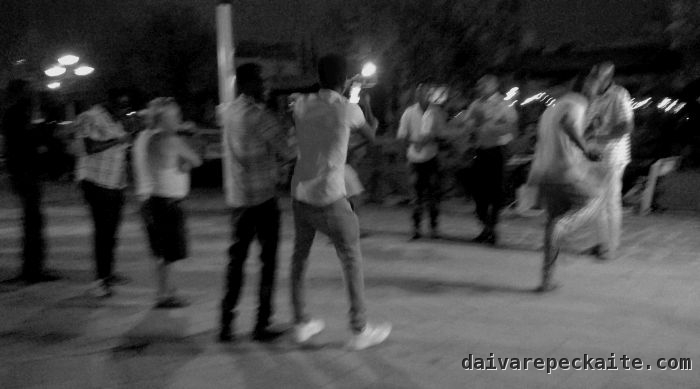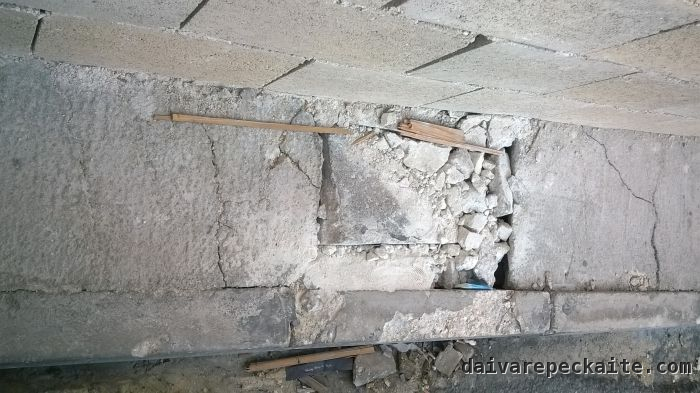The first day of September was rich in intercultural events: Appogg (the governmental youth agency) and UNHCR Malta brought several communities together to share food and traditional music in Msida, targeting mostly families in their Building Friendships event, and Spark15, a young migrants’ NGO, publicized a contemporary music and games event in Valletta. It was a tough choice, but Msida and Valletta being relatively close, I expected to make it to both. The first one was attractive for the opportunity to meet organized diaspora communities in Malta. The second one promised an energetic and youthful vibe.
Msida, home of Malta’s junior college, is a well-connected town by the sea. With the event taking place opposite the church, there was a good chance that passers-by would spot it and spontaneously decide to join. The center of the square was kept free for folk dancing performances, and several food stalls were arranged in a semicircle, offering Palestinian/ Levantine, Bangladeshi, Ghanaian, Maltese and Somali food, with face-painting and drums workshops in between.
Some senior citizens, most probably on their regular stroll by the marina, cautiously walked by and, after some encouragement, stopped to sample unusual food. It was also beautiful to see that people from the different migrant communities were curious about the other participants, trying their food, commenting on their music and saying a few words they knew in each other’s languages. Some of the participants advertised the restaurants they run.
The Palestinian family running the Levantine food stall turned out to be from Gaza and has lived in Malta for decades. They had pictures of various landmarks of the Palestinian Authority and some from Syria. I told them about the places I have visited in the West Bank, and since there was a photo of al Aqsa mosque, I told them I had been there, too. The next moment I started having doubts whether it was a right thing to do. It must be heartbreaking to be constantly reminded that a random Lithuanian can go to their sacred place any time, but they can’t.
Positive outlook about life in Malta radiated from all the people I talked to. The Palestinian family pointed out that it was good to enjoy the sea (access to any sea is restricted to Palestinians in PA), the Bangladeshis said it’s great to be in a place with job opportunities, and one of the Somalis, whose journey to Malta across Libya and the Mediterranean is known to be perilous, exclaimed while dancing and singing along to a Somali song played on the loudspeakers, “Malta is good!”
I had initially arranged to go to the event with a colleague who has a young daughter – with infrastructure in Malta being as awful as it is, moving around is a daily challenge for her.
In the end she couldn’t join me, as the baby was restless, so we agreed that I’ll drop by after the festival – she lives in the same town anyway. I collected samples from the various ethnic cuisines in a box for her and set out to follow the map towards her place. However, as it typically happens, sidewalk soon disappeared, and I was left with a prospect of walking on the side of a poorly lit road. I’d rather not. People who have not been here think that the island is so small that it’s possible to walk everywhere. But Google maps shouldn’t be trusted
I went back and found a place in the crowd to wait for a bus at Msida bus stop, where buses stop in both directions. When a bus serving one of the circular lines came, with “Valletta via San Gwann” at its front, I asked the driver if he was going to San Gwann first. “It’s written – Valletta,” he mumbled. “But are you going to Valletta straight away or to San Gwann first?” I checked. He laughed in my face. There is a shortage of bus drivers in Malta, so even the meanest, passenger-hating, incompetent individuals get to keep their jobs. I didn’t get on that bus.
I didn’t go to Valletta that night. On a typically bumpy ride, a Somali crepe, Ghanaian rice and beans, and Bangladeshi stews in the box I was carrying turned into a mushy mass. Buses are blenders, mixers and shakers of cultures in every way. They are used by Maltese senior citizens and teenagers, plus immigrants like myself and tourists. It’s not as bad for me. Black people experience the same logistical issues as I plus casual microaggressions on buses in Malta. Drivers deciding not to stop for them at bus stops or not to let them in, or assaulting them, passengers saying mean things and glaring with contempt – we will never know how many of these experiences go unreported, but people I have talked to informally or interviewed said the only thing they do is to build resilience and try not to pay attention. Among minorities in the EU, Africans in Malta are the fourth most likely to experience in-person racist crime.
“Malta is good,” the cheerful Somali said. I will believe it as long as I hear it from him.



